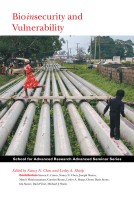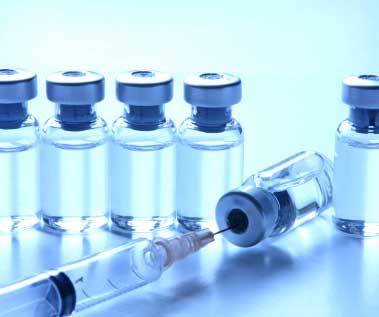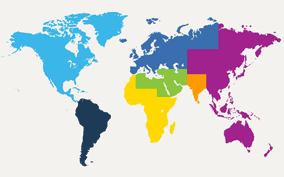-
Op-Ed – Dual-Use Research: Is it possible to protect the public without encroaching rights?

T. Tosin Fadeyi, Master’s Candidate, Biotechnology (Biodefense and Biosecurity Concentration), University of Maryland University College For decades, scientists have had reasonable freedom and control over their research and experiments and able to publish and share their work without much inconvenience. The freedom of creativity in the field of science is much like that of an artist – often fueled by an inspiration from other sources, a passion for a unique realm of art (in this case, science), and a natural curiosity. Within reasonable limits, artists and scientists had the world at their fingertips; as long as they weren’t causing a societal disruption Read More »
- May 18, 2015 |
- Filed Under Biosafety, Biotechnology, International, Policy & Initiatives, Research
-
Book Review: Bioinsecurity and Vulnerability

Reviewed by T. Tosin Fadeyi Edited by Nancy N. Chen and Lesley A. Sharp Contributors: Steven C. Caton, Nancy N. Chen, Joseph Masco, Monir Moniruzzaman, Carolyn Rouse, Lesley A. Sharp, Glenn Davis Stone, Ida Susser, David Vine, and Michael J. Watts. Bioinsecurity and Vulnerability is an intuitive compilation of writings that explore the hysteria surrounding preparation for a silent threat: biological terror. The essays in this book illustrate the reality of biological preparedness in the 21st century by bringing together previously unacquainted realms like genetic engineering, the military, and accidental disasters around the world. Bioinsecurity features relevant photography to illustrate and enhance the contributors’ discussions. Rather Read More »
- April 30, 2015 |
- Filed Under Biosafety, Bioterrorism, International, Policy & Initiatives
-
Op-Ed – Microbial Forensic Attribution: Where Science Meets International Relations

Christopher A. Bidwell, JD, Senior Fellow for Nonproliferation Law and Policy, Federation of American Scientists & Mark Jansson, Program Manager, CRDF Global. The U.S. government is making significant investments in bio forensics as a tool for attribution. In order for that investment to pay-off, it must be combined with investments in international collaborations so that the science behind any future attribution claims that may be made are accepted as fact, both in scientific and political terms. To better understand how evidence derived from microbial forensics will be received in international contexts among people with different cultural, professional, and political backgrounds, the Federation of American Read More »
- July 17, 2014 |
- Filed Under Agents & Toxins, Biocrimes, Biological Weapons, Biosafety, Bioterrorism, Countermeasures, International, Policy & Initiatives, Public Health
-
Op-Ed – Science Needs for Microbial Forensics: Developing Initial International Research Priorities

Committee on Science Needs Microbial Forensics: Developing an Initial International Roadmap, Board on Life Sciences, Division of Earth and Life Sciences, National Research Council of the National Academies. Today we find ourselves with a complex infrastructure of government agencies, Select Agent registries, regulated research, environmental monitoring in designated cities, federal and state regulations—all resulting from one more or less successful biological attack on the United States. The Amerithrax attack with highly refined material produced by a knowledgeable expert (presumably in a U.S. bioweapons laboratory) resulted in 22 illnesses and 5 deaths. Approximately 4 g of material were used in the Amerithrax attack. Read More »
- July 17, 2014 |
- Filed Under Agents & Toxins, Agriculture, Biocrimes, Biological Weapons, Biosafety, Biotechnology, Bioterrorism, Countermeasures, International, Policy & Initiatives, Public Health, Research
-
Vaccinations have prevented at least 103 million cases of contagious disease since 1924

(TheVerge) Vaccinations have been credited with some of humanity’s greatest health technological triumphs over disease, including drastically reducing polio around the globe and almost eliminating smallpox entirely. But how many people have been spared life-threatening infections thanks to the introduction of vaccines? At least 103.1 million children in the US alone since 1924, according to a new analysis of historical infection rate data going back to 1888.
- December 2, 2013 |
- Filed Under Policy & Initiatives, Public Health
Browse by region

Browse By Category
Camel gene register may lead to cures
(The National) DUBAI – A new genetic registry for camels could help identify specific traits in the animals and allow more effective breeding. The Central Veterinary Research Laboratory and the Dubai Camel Racing Club have started working on a stock-book for camels to be able easily to discern potential qualities in Read More »
- June 7, 2012
- | Filed under Africa, Middle East, Agriculture, Policy & Initiatives, and Research
Griffith University tackles deadly Hendra virus
(Griffith University) Australian medical researchers are on the brink of an effective human treatment for the deadly Hendra virus, and potentially the closely related Nipah virus, which has killed more than 200 people in South East Asia. Associate Professor Nigel McMillan from Griffith University’s School of Medical Science has been awarded Read More »
- June 7, 2012
- | Filed under Asia/Pacific, Public Health, and Research
NWD councillors suspect Govt sabotage over FMD
(Mmegi Online) MAUN: North West District councillors have expressed suspicions that there seem to be a hidden agenda on the part of the government to let Ngamiland become a permanent Foot and Mouth Disease (FMD) red zone so that it can eventually turn it into a wildlife region for purposes of Read More »
- June 7, 2012
- | Filed under Africa, Agriculture, and Policy & Initiatives
‘Hunger Games’ Science: Investigating Genetically Engineered Organisms
(New York Times) What lessons can we learn about genetically engineered organisms from the example of the jabberjay, a fictional bird in the movie “The Hunger Games”? In this lesson, students discuss the definition of genetically modified organisms, learn about the risks and benefits of research on G.M.O.’s, explore the growing Read More »
- June 7, 2012
- | Filed under North America, Biosafety, Policy & Initiatives, and Research
Fate of Kansas Biodefense Lab May Hinge On Two Reports Due This Month
(Global Security Newswire) The findings of two analyses due this month from the National Research Council could determine the fate of a planned high-tech animal disease research laboratory in Kansas, Reuters reported on Sunday. Construction on the $1 billion National Bio and Agro-Defense Center in Manhattan has yet to begin. Budget Read More »
- June 7, 2012
- | Filed under North America, Agriculture, and Policy & Initiatives
Countermeasures More »
-
BAA – Medical Countermeasures for Priority Pathogens
(Global Biodefense) The National Institute of Allergy and Infectious Diseases (NIAID) has released Read More »
-
New Antibody Weapons Against Marburg Virus
(Global Biodefense) A new study led by scientists at The Scripps Research Institute identifies Read More »
-
FDA Accepts BLA for Inhalational Anthrax Countermeasure
(Global Biodefense) Anthim (obiltoxaximab) is for the treatment and prevention of inhalational anthrax, Read More »
-
South Korea MERS death toll rises to 20
(CNN) The World Health Organization said Tuesday that the number of new cases Read More »
-
What you should know about MERS, the mystery disease that has South Korea on edge
(Washington Post) The spread of MERS, which has infected 126 people since the outbreak began last Read More »
Research More »
-
We Now Know More About Sexually Transmitted Ebola
(TIME) In March 2015, officials discovered that a Liberian man who had survived Read More »
-
Scientists find new variant of streptococcal bacteria causing severe infections
(Imperial College London) Scientists have discovered a new variant of streptococcal bacteria that Read More »
-
VUMC joins Human Vaccine Project as first scientific hub
Vanderbilt University Medical Center (VUMC), the Human Vaccines Project and the International AIDS Read More »
-
Researcher who spiked rabbit blood to fake HIV vaccine results slapped with rare prison sentence
(Washington Post) Dong Pyou Han, a former Iowa State University researcher charged with Read More »
-
New Antibody Weapons Against Marburg Virus
(Global Biodefense) A new study led by scientists at The Scripps Research Institute identifies Read More »
Public Health More »
-
How Yelp Can Be Used to Track Outbreaks of Food Poisoning
When a Shigella outbreak at a San Jose, California, seafood restaurant sickened dozens Read More »
-
We Now Know More About Sexually Transmitted Ebola
(TIME) In March 2015, officials discovered that a Liberian man who had survived Read More »
-
Legionnaires’ Bacteria Regrew in Bronx Cooling Towers That Were Disinfected
(TheNewYorkTimes)- The 15 water-cooling towers that were found to be contaminated this week Read More »
-
Millions More Need H.I.V. Treatment, W.H.O. Says
(TheNewYorkTimes)- The World Health Organization issued sweeping new guidelines on Wednesday that could put Read More »
-
Sentencing scheduled for peanut executive in salmonella case
(Washington Post)- ALBANY, Ga. — A former peanut executive convicted of shipping tainted Read More »
































